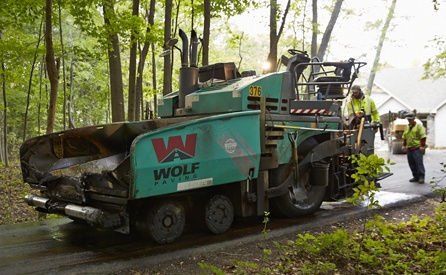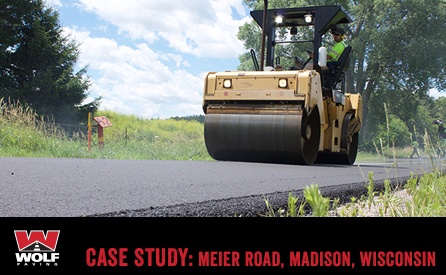https://t.co/vEgdmlbbRy thanks for following us! Have a great day :) #driveways #pavingcontractor
— Wiltshire Driveways (@drivewaysuk) September 30, 2016
from Twitter https://twitter.com/drivewaysuk
September 30, 2016 at 03:49PM
https://t.co/vEgdmlbbRy thanks for following us! Have a great day :) #driveways #pavingcontractor
— Wiltshire Driveways (@drivewaysuk) September 30, 2016
 It’s never too late to learn something new, and when it comes to asphalt pavement installation, there are many things that homeowners, commercial property owners and municipality employees many not be aware of.
It’s never too late to learn something new, and when it comes to asphalt pavement installation, there are many things that homeowners, commercial property owners and municipality employees many not be aware of.
At Wolf Paving, we are asphalt paving contractors in Milwaukee, Oconomowoc and Madison who take pride in educating people about everything asphalt — it’s our passion.
So please, take a look at this step-by-step overview of what an asphalt pavement installation requires — from demolition all the way to a smooth, new surface.
The first step in the asphalt installation process is to remove the existing surface, whether it is asphalt, concrete or pavers.
With a clean slate, technology helps Wolf Paving asphalt professionals prepare the surface for appropriate water drainage.
You’d never guess that the most important part of your new asphalt surface is actually the sub base.
Once the sub base is fully graded and compacted, Wolf Paving completes an extra step, called a proof roll, to ensure the underlying surface is strong and ready to support new asphalt.
If the proof roll finds soft areas in the sub base, Wolf Paving makes the necessary repairs in compromised areas to ensure the entire sub base is supportive.
Once the sub base is laid and any soft areas are identified and repaired, it is time to add the binder.
Once the supportive structures of a new asphalt surface are installed, the top layer of fresh asphalt is added to provide a clean, smooth ride.
It is very rare to install an asphalt surface that does not connect to existing driveways, roadways or parking lots. As such, asphalt-paving contractors must find a way to smooth the transition from old surface to new.
Once the asphalt and butt joints have been laid, the entire surface is smoothed and compacted.
Your asphalt paving contractor should follow these installation steps to make sure your new asphalt surface will provide years of durability and functionally for your home, business, city or town.
But remember that installation process should only follow a proper surface inspection and a complete estimate. Take a look at the articles below that explain those processes completely.
With 75 years of asphalt paving experience, from highways to driveways, we are your local source for all of your asphalt paving needs.
For more information on Wolf Paving or to request a free estimate for your next paving project contact one of our two offices. If you live or work in the Milwaukee area, call us at 262-965-2121. For the Madison area, call us at 608-249-7931.
A £4m construction project currently being undertaken by the Highways Division of North Midland Construction plc (NM Group) to enhance public spaces in Sheffield city centre, has provided one young person with paid work  experience that should hopefully help him to kick start his career.
experience that should hopefully help him to kick start his career.
The NM Group is installing a new footpath and cycleway scheme designed to improve safety and rejuvenate main routes to the University of Sheffield Campus. The company needed additional members of staff to work on the project and turned to Skills Made Easy for help with its search. Skills Made Easy is a unique government backed programme designed to help businesses overcome skills shortages in the Sheffield City region and also to help young people develop their skills by connecting them with businesses operating in the area.
19 year old Hezakiah (Hez) Williams from Parsons Cross had completed a BTEC qualification in construction but found himself unable to break into the industry he loved. He contacted Skills Made Easy and they arranged a two week work trial for him with the NM Group.
During the trial, when he was overseen by qualified and experienced personnel, Hez had the opportunity to work on the renewal of the streetscape around the University buildings. He performed well and with commitment, successfully passing his trial.
He is still in the employment of the NM Group and has since been involved in numerous construction activities to assist in the project’s progress including groundworks, drainage, paving preparation and kerbing. Further arrangements are underway to provide Hez with additional skills training through NM Academy – the company’s learning and development programme
Chris Davis, N M Group’s construction site manager on the project said:
“We are really pleased with the progress that Hez has made in the short time he has been working for us. He has shown a real aptitude for learning a variety of construction principles in a live project environment and a keen enthusiasm for developing new skills. I am confident that Hez will become a valuable asset to the team and this would not have been possible without Skills Made Easy.”
Laura Hayfield, programme manager, Skills Made Easy said:
“Work trials give individuals like Hez, who have found it difficult to secure a career in their chosen sector, a chance to gain experience and illustrate to employers what they can bring to the business. Hez had wanted work in the construction industry but since leaving school he had struggled to secure a permanent role. He has impressed his new employers with his skills and genuine interest in the sector and his commitment has enabled him to continue to develop new skills with the NM Group.”
“For employers work trials help them ensure that the person they are recruiting fits in well with their existing workforce and has the aptitude to succeed.”
Skills Made Easy is a free of charge service which offers impartial, tailored advice to small and medium sized businesses based in the Sheffield City Region. The service helps employers to overcome skills shortages in the workforce which could be impacting on growth and to access Government grants to cover the cost of training. The service is delivered free of charge to all businesses based in the Sheffield City Region, employing fewer than 250 members of staff. For more information, visit www.skillsmadeeasy.org.uk or telephone 0114 229 6183.
 Preventative maintenance in the fall ensures that you won’t be faced with big problems when snow arrives in the coming months.
Preventative maintenance in the fall ensures that you won’t be faced with big problems when snow arrives in the coming months.
When you are doing your seasonal inspections, don’t forget to look down – the asphalt paving that makes up your parking lot, driveway, or walkways might also need some attention.
Making room in your budget for preventative asphalt maintenance will keep your property looking great, increase safety and even save you money in the long run. Completing relatively affordable projects like crack and pothole filling provide a great return on your investment as they have both immediate and long-term benefits.
To protect your asphalt pavement (and your bottom line), here just three of our asphalt paving fall tips:
 Asphalt surface inspection: Are there cracks or potholes that need to be filled? Cracks and potholes allow water to penetrate the surface of your pavement. During the inevitable freeze and thaw cycles of winter and spring, your asphalt pavement can be severely damaged by water under the surface. This extreme, expensive damage can be easily avoiding by following our asphalt paving fall tips.
Asphalt surface inspection: Are there cracks or potholes that need to be filled? Cracks and potholes allow water to penetrate the surface of your pavement. During the inevitable freeze and thaw cycles of winter and spring, your asphalt pavement can be severely damaged by water under the surface. This extreme, expensive damage can be easily avoiding by following our asphalt paving fall tips.

Water pooling evaluation: Do you see standing water? Making sure that water run-off is being managed correctly will help prevent damaging water penetration, and keep your asphalt free of the snow and ice that is sure to come this winter.

Seasonal aesthetic evaluation: Is your pavement looking worn? Quick treatments like sealcoating can make your asphalt look like new again, greatly increasing the curb appeal of your property.
Make sure you don’t leave preventative asphalt maintenance off of your fall to-do list. Proper maintenance on your pavement, from a reputable Madison, Oconomowoc or Milwaukee asphalt paving contractor will help extend the life of your asphalt, saving you money on costly projects like total replacement.
For help with creating a custom plan for your property, download a free copy of our Autumn Maintenance Checklist.
Our checklist will help you to evaluate your asphalt surface, and give you an idea of what you need to budget for this fall.
Request an Asphalt Paving Estimate Now
Wolf Paving offers professional paving services from Milwaukee to Madison, and everywhere in between, including all areas around: Sun Prairie, Oconomowoc and Waukesha.
It’s never too early or too late to request a free paving estimate. Call Wolf Paving today to get help from the most experienced parking lot contractors in Waukesha. For the Milwaukee area, call us at 262-965-2121. For the Madison area, call us at 608-249-7931.
Newly appointed Scheme Executive Chairman Isabel Martinson to recruit new Board Directors to take Scheme to the ‘next level’
 London, United Kingdom, 19 September 2016: The Considerate Constructors Scheme (CCS) – the national Scheme to improve the image of the construction industry – is recruiting for new Board Directors.
London, United Kingdom, 19 September 2016: The Considerate Constructors Scheme (CCS) – the national Scheme to improve the image of the construction industry – is recruiting for new Board Directors.
Isabel Martinson, who was appointed as Executive Chairman of the Scheme in July 2016, is looking for senior representatives from within and outside of the construction industry to expand the CCS to move to the ‘next level’, to further enhance the construction industry’s image and reputation.
The CCS is an independent organisation formed in 1997. Since its formation, it has significantly altered the approach the construction industry takes to those affected by its activities, the construction workforce, and the impact construction has on the local environment. It has achieved wide recognition and is highly regarded and respected by those aware of and involved in the Scheme.
Construction sites, companies and suppliers voluntarily register with the Scheme and agree to abide by the Scheme’s Code of Considerate Practice. The Code commits those registered with the Scheme to care about appearance, respect the community, protect the environment, secure everyone’s safety and value their workforce.
The Scheme is looking for new Board members who are committed to the Scheme’s ethos, and in particular, those with expertise in the areas of marketing and communications, finance, commercial contracts and outsourcing.
 Considerate Constructors Scheme Executive Chairman Isabel Martinson commented: “The CCS provides a hugely important and influential role in helping to enhance the construction industry’s reputation to the public, those within the industry and the Government. I look forward to working with a team of newly appointed Board Directors to shape the future reputation of the construction industry through the Considerate Constructors Scheme.”
Considerate Constructors Scheme Executive Chairman Isabel Martinson commented: “The CCS provides a hugely important and influential role in helping to enhance the construction industry’s reputation to the public, those within the industry and the Government. I look forward to working with a team of newly appointed Board Directors to shape the future reputation of the construction industry through the Considerate Constructors Scheme.”
Terms of reference, person/skills specifications and the application procedure are available via the Scheme’s website here.
The application deadline is 1200 on Wednesday 5 October 2016.
Minister confirms support of Prompt Payment Code and success in changing payment culture
New measures to support the Prompt Payment Code (PPC) and drive a culture of better payment practice have been confirmed in a letter to PPC signatories from Margot James, Minister for Small Business and Philip King, Chief 
 Executive of the Chartered Institute of Credit Management (CICM).
Executive of the Chartered Institute of Credit Management (CICM).
The letter highlights the significant success of the Code to date, and in particular highlighting the challenges against Code signatories that it says have been ‘hugely successful in achieving fast settlement of invoices, creating dialogue between parties, improving contract terms, and providing constructive assistance welcomed by suppliers and signatories alike’.
The correspondence also confirms the future appointment of a Small Business Commissioner to provide help and advice to business, including on achieving prompt payment, and the Statutory Duty to Report for large businesses to report on payment practices that comes into force from 6 April, 2017. Further strengthening of the Code will follow the implementation of the Duty to Report measures.
The authors of the letter confirm that signatories should be paying within 30 days where possible and that this should increasingly be the norm. The Code Compliance Board will not be enforcing 30 day terms but states that paying invoices within 60 days will be a requirement unless there are exceptional circumstances that will be considered on a case by case basis. An example of ‘exceptional circumstances’ might be where a company is able to demonstrate that it applies different terms to the benefit of their smaller suppliers.
The Minister says that: “Prompt payment can make all the difference to small businesses, boosting their cashflow and allowing them to invest in growth for the future. Although we have seen some progress, there are still too many business owners across the country who have not been paid on time by their customers.
“We need a culture change to stamp this out and the Prompt Payment Code continues to play an important role in bringing this about, alongside a package of measures taken forward by government and industry. The businesses signed up to the Code commit to demonstrating the gold standard of payment practices and it’s great to see so many of Britain’s leading household names on the list.”
The Prompt Payment Code is administered by the CICM on behalf of the Department for Business, Energy and Industrial Strategy (BEIS). It currently has more than 1,800 signatories, with each signatory committing to best practice in the fair and equal treatment of suppliers, many of whom are smaller businesses.
Last year the Government announced a series of measures within the Small Business, Enterprise and Employment Act to further strengthen the Code.
 Advancing technology plays an important role in everyday life. From phones and televisions, to kitchen appliances and vehicles — we all use technology and often seek out the latest and greatest models.
Advancing technology plays an important role in everyday life. From phones and televisions, to kitchen appliances and vehicles — we all use technology and often seek out the latest and greatest models.
When it comes to the asphalt paving industry, however, you likely don't think about how new technology plays a role in the repair and installation process of asphalt paving. But while you get excited about the latest tablet to hit the market, we get excited about new grading and slope technology and the advancement in asphalt mixes.
Take a look below at our infographic, highlighting outdated and new approaches to asphalt pavement installation in Milwaukee, Waukesha and Madison. You may be surprised to learn about all of the amazing things our team of asphalt paving contractors at Wolf Paving can do with the new paving technology.

Wolf Paving offers professional paving services from Milwaukee to Madison, and everywhere in between, including all areas around: Sun Prairie, Oconomowoc and Waukesha. It’s never too early or too late to request a free paving estimate.
Call Wolf Paving today. For the Milwaukee area, call us at 262-965-2121. For the Madison area, call us at 608-249-7931.
https://t.co/hs2Yk4CPac thanks for following us! Have a great day :) #driveways #pavingcontractor
— Wiltshire Driveways (@drivewaysuk) September 14, 2016
https://t.co/c9xg9cGPQ2 thanks for following us! Have a great day :) #driveways #pavingcontractor
— Wiltshire Driveways (@drivewaysuk) September 13, 2016
https://t.co/gXK3W5u4KU thanks for following us! Have a great day :) #driveways #pavingcontractor
— Wiltshire Driveways (@drivewaysuk) September 13, 2016
 Wolf Paving completed a municipal asphalt pavement road overlay to improve the surface of a deteriorating asphalt roadway.
Wolf Paving completed a municipal asphalt pavement road overlay to improve the surface of a deteriorating asphalt roadway.
Wolf Paving's team of Madison municipal asphalt pavement contractors was tasked with laying a fresh, new surface and creating smooth transitions from old road and driveways to new road.
The project completed was Meier Road, just off E. Buckeye Road in the town of Blooming Grove.
For this municipal road-paving job, Wolf Paving was required to consider the best option for paving to accommodate budget considerations. In addition, Wolf Paving would be tasked with transitioning in the new asphalt surface to the existing road, and residential and commercial driveways along the road.
It was determined that an asphalt overlay would be the best course of action to improve the roadway surface. An asphalt overlay would provide the municipality with 12 – 15 years of durability and cost significantly less than a complete removal and re-installation.
The customer feedback on the final result was excellent. The project was completed on time and on budget with no unforeseen issues.
Wolf Paving offers professional paving services from Milwaukee to Madison, and everywhere in between, including all areas around: Sun Prairie, Oconomowoc and Waukesha.
It’s never too early or too late to request a free paving estimate. Call Wolf Paving today to get help from the most experienced parking lot contractors in Waukesha. For the Milwaukee area, call us at 262-965-2121. For the Madison area, call us at 608-249-7931.
Mobile CAD Surveying Solutions Ltd can accommodate either a simple single property floor plan for a domestic or  private customer to a complete schedule of buildings including whatever type of data collection the customer requires for commercial customers. If Architects or Surveyors and you require fast turn around building surveys, please give us a try! we currently work for dozens of architects, surveyors and designers around the UK, where they haven’t the capacity or staff to handle their own surveys or where they just require someone to make sure the job is done right, first time, Mobile CAD Surveying Solutions can help you.
private customer to a complete schedule of buildings including whatever type of data collection the customer requires for commercial customers. If Architects or Surveyors and you require fast turn around building surveys, please give us a try! we currently work for dozens of architects, surveyors and designers around the UK, where they haven’t the capacity or staff to handle their own surveys or where they just require someone to make sure the job is done right, first time, Mobile CAD Surveying Solutions can help you.
Currently we are working on many Commercial surveys around the country, with a number of domestic and Dimensional Property Surveys around the UK and into Europe, if you require any type of Measured Building Survey then please contact us.
We can provide Floor plans, Elevational drawings, or a Topographical survey also Underground Utility Traces and all types of Measured Building Survey with varying levels of detailed work – from simple walls, columns, doors and window surveys, to a fully detailed data set including all 3D information including cill & head heights, stair riser and going details, door heights, ceiling heights, beam details, fitted furniture etc.. As part of our measured surveys, the surveyors can also pick up and highlight other information for example: any electrical and data points, sanitary fittings, incoming mains positions, plant, fire fighting and detection equipment, security equipment, signage and so on.
An accurate topographical survey or land survey is essential to any project that you are considering and can lessen the possibility of costly mistakes or unforeseen issues later on. The amount and type of topographical survey data that we collect on site is always based on your specification. However, our experienced land surveyors will use their knowledge of planning and development issues and requirements to provide additional information that might be vital for any future design or planning application. We are also able to gather information from any utility companies which can be added to your topographical survey drawings..
360D Panoramic Photography – We can also provide a 360 degree photographic record of your project to aid with design/construction
The ‘as built’ documentation provided by the company is highly detail oriented, every project can be accompanied by 360 degrees photographs to provide better understanding of the plans. Photographs give clients instant visuals which help in picturing the plan in a much better fashion.
We can also provide other additional land surveying services that you may require, for example; underground services tracing ( GPR – Ground Penetrating Radar) and 3D laser scanning enable us to provide you with a one-stop-shop for your surveying requirements.
for more information, please visit:-
 The Chartered Institute of Building has launched a call for evidence into skills, materials and new technology in the housing sector. The work forms part of a wider coalition – the National Housing Taskforce – which has been convened by the Royal Institution of Chartered Surveyors (RICS) and the All Party Parliamentary Group (APPG) for Housing and Planning.
The Chartered Institute of Building has launched a call for evidence into skills, materials and new technology in the housing sector. The work forms part of a wider coalition – the National Housing Taskforce – which has been convened by the Royal Institution of Chartered Surveyors (RICS) and the All Party Parliamentary Group (APPG) for Housing and Planning.
The Taskforce, which has already met with new Housing Minister Gavin Barwell MP, is operating across 12 distinct areas of work to take a holistic view of how to tackle the housing crisis, covering everything from planning reform to housing associations, and construction skills to mortgage finance. Each work-stream is being led by a relevant organisation which will submit recommendations to the Taskforce later in the year.
The CIOB’s work-stream is charged with addressing the main issues in the construction labour market, including availability, productivity and diversity. Additionally, it will look at materials and new technology, primarily off-site manufacture and modern methods of construction (MMC), including how they link to skills. The call for evidence can be accessed here: http://policy.ciob.org/consultations/
David Hawkes, CIOB Policy Manager, said: “At its most basic level, what this work-stream boils down to is capacity. Studies have shown the housing sector needs 120,000 new employees just to meet the required annual level of homes the UK needs. At the same time, house builders say they cannot build more than 150,000 homes per year via conventional means.
“What this suggests to us is that something needs to fundamentally change if we are to properly address the housing crisis. We need more people working more productively and we have to work out how best to utilise and implement new technologies, materials and processes.”
Explaining how the work-stream will progress, Hawkes said: “The CIOB will be working closely with MPs and industry experts to analyse the responses we receive. We’ll then host a number of inquiry-style discussions to hone in on the most relevant evidence and submit our recommendations to the National Housing Taskforce by the end of the year.”
The CIOB’s call for evidence is inviting submissions from industry, government, education establishments, professionals and other interested stakeholders that shed light on addressing the skills gap that currently exists across the sector. Additionally, the CIOB is keen to hear of the opportunities for improving productivity and driving down costs through the use of construction techniques such as off-site manufacture. Of particular interest are successful initiatives both for skills and technology that are operating at scale, or could be scaled up.
Suggested areas that evidence might cover, though this is by no means exclusive, are as follows:
Evidence needs to be submitted by 17:00 on 9 September 2016. Full details and guidelines on submission can be found here: http://policy.ciob.org/consultations/
The CIOB hopes to invite as many people and organisations as possible to give oral evidence during sessions later in the year. The final National Housing Taskforce report, incorporating recommendations from all twelve work-streams, is expected to be released by Spring 2017.
Construction Workers and Asbestos Exposure
Asbestos has been used extensively in the construction industry throughout the world. In the UK this material was still being used up to 1999, while in other countries its use was discontinued decades earlier. The reason for no longer using asbestos for insulation, roofing, and other construction components is that inhaling its fibers can lead to health problems. These include the aggressive and most often deadly type of cancer called mesothelioma.
The UK has some of the highest rates of mesothelioma because of the extensive use of asbestos and the late discontinuance. The number of cases of this cancer has been rising for decades, as has the number of deaths caused by it. Each year for the last few years, more than 2,000 men have died from mesothelioma, many of them working in the construction industry.
Exposure to Asbestos
Asbestos is a natural mineral, mined for its usefulness as an insulator. It resists heat, fire, and electricity, and it is mostly chemically inert. For millennia people have mined this material to be used for many purposes, but with most applications going into construction materials, buildings, and ships.
Contained asbestos is not a problem, but when it is cut, torn, or otherwise disrupted, fibers get into the air. When you breathe in these fibers they can lodge in the lungs and cause irritation, damage, and illness. Construction workers are at risk of being exposed to these fibers in the work they do every day. The biggest risks come during demolition or renovation of buildings that contain asbestos.
Illnesses Caused by Asbestos
Asbestos exposure is a major risk for construction workers. Inhaling fibers of the mineral put these workers at risk for a number of serious health concerns. One of these is asbestosis, which is the formation of scar tissue in the lungs. It does not always lead to death, but the symptoms can be debilitating. Pleural thickening is another potential health problem. The pleura is the tissue that lines the lungs and asbestos can cause it to thicken. This makes breathing difficult.
Exposure to asbestos fibers can also lead to fatal types of cancer. Asbestos-related lung cancer and mesothelioma are both connected to asbestos and both are most often fatal. The longer a worker is exposed to asbestos, the greater the frequency of exposure, and the greater the amount of asbestos inhaled, the greater the risk for developing one of these conditions.
The Problem with Mesothelioma
Any illness caused by asbestos has the potential to be debilitating or fatal, but mesothelioma is particularly devastating. It takes years for the cancer to be diagnosed because symptoms are not always severe until the late stages and they resemble those of other conditions. By the time a construction worker gets a diagnosis of mesothelioma it is typically too late for treatments to cure it.
The biggest occupational hazard for construction workers in the UK is exposure to asbestos. Many construction workers who developed fatal and debilitating lung conditions from this exposure were not told by their employers that they were at risk. Many are seeking compensation through asbestos